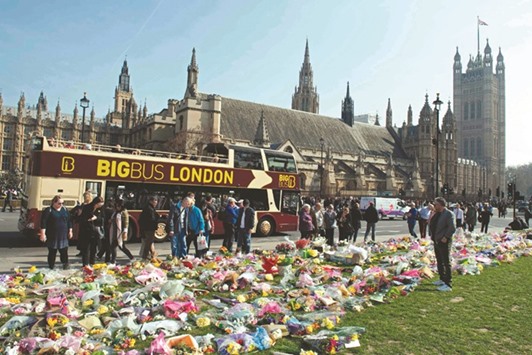Heavily armed police stood guard as the Palace of Westminster gates re-opened for the first time yesterday.
The Carriage Gates, stormed by fanatic Khalid Masood last Wednesday, were manned yesterday morning by five apparently unarmed officers, who chatted to tourists and passers-by.
Immediately behind stood two armed officers while more armed patrols were in New Palace Yard, where police constable Keith Palmer died, and other parts of the Parliamentary estate. Outside the gates, a wall of flowers has built up in recent days. Many of the displays pay tribute to Palmer, 48, stabbed trying to stop Masood entering Parliament.
The terrorist, who had mown down 50 people on Westminster Bridge, was shot dead inside New Palace Yard by one of Defence Secretary Sir Michael Fallon’s personal protection team.
One of the tributes at the gates reads: “Dear Keith, RIP, you are a true hero! Our thoughts are with your family & friends.”
Foreign Office minister Tobias Ellwood, who tried desperately to save Palmer’s life, was among the thousands of people who read messages left with hundreds of bouquets of flowers on Parliament Square.
One of them, from the prime minister, read: “With deepest condolences for those who lost their lives as a result of this evil and cowardly attack. Our thoughts and prayers are with them and their families.”
The family of Palmer visited the spot where he died on Saturday.
Yesterday MPs and peers stepped up demands for security to be bolstered at Westminster amid reports that a table-top “war game” of a full-blown terrorist attack on Parliament, with four assailants with automatic weapons, could have left many MPs and other people on the premises dead.
Former Met Police commander Lord Paddick tweeted: “We need to protect unarmed officers at perimeter.”
Shadow foreign secretary Emily Thornberry suggested barriers should be put up to seal off part of the estate where a terror strike could take place and that messages on how to respond could be broadcast by Tannoy.
She told BBC radio’s The Westminster Hour: “There was confusion. And the truth is there are a lot of people who aren’t MPs and they don’t have access to e-mails, and the visitors, and everybody else, they didn’t know what was going on and they didn’t have that form of communication. We have to think about a communication system that works for everybody.”
A row continued to rage yesterday over the encrypted messaging service WhatsApp, for potentially allowing terrorists to communicate undetected. Masood is understood to have used the app moments before embarking on his 82-second killing spree, in which he mowed down tourists and workers on Westminster Bridge in a rented 4x4.
Home Secretary Amber Rudd called for encrypted networks to build back doors into their systems so security services can access terrorists’ messages during investigations.
Two men remained in custody yesterday over the Westminster attack. Masood’s most recent partner, Rohey Hydara, and a 32-year-old woman have been released after their arrest last week.
Counter-terror detectives believe the killer acted alone on the day but are still trying to establish if he had help in planning the attack.
In other developments:
l MI5 is thought to have investigated Masood’s links with four Al Qaeda-inspired terrorists who admitted plotting a bomb attack on a Territorial Army base in Luton.
l Masood may have been influenced by the teachings of jailed Islamic State supporter Anjem Choudary while he was living in Luton.

People stop to look at floral tributes to the victims of the March 22 terror attack outside the Houses of Parliament in Westminster, central London, yesterday.
